Covid: Royal Glamorgan Hospital nurse felt 'overwhelming fear'
- Published
Senior doctor Amanda Farrow said the hospital faced "unrelenting" pressure
A nurse felt "overwhelming fear" as 13 ambulances queued at her hospital's A&E department - in the Welsh region currently hardest hit by Covid deaths.
To date Cwm Taf Morgannwg health board, which runs Royal Glamorgan Hospital, has reported 1,091 deaths of patients with coronavirus.
BBC Wales was granted access to A&E at the hospital in Rhondda Cynon Taf.
Senior doctor Amanda Farrow said the whole hospital had faced "unrelenting" pressure last Saturday.
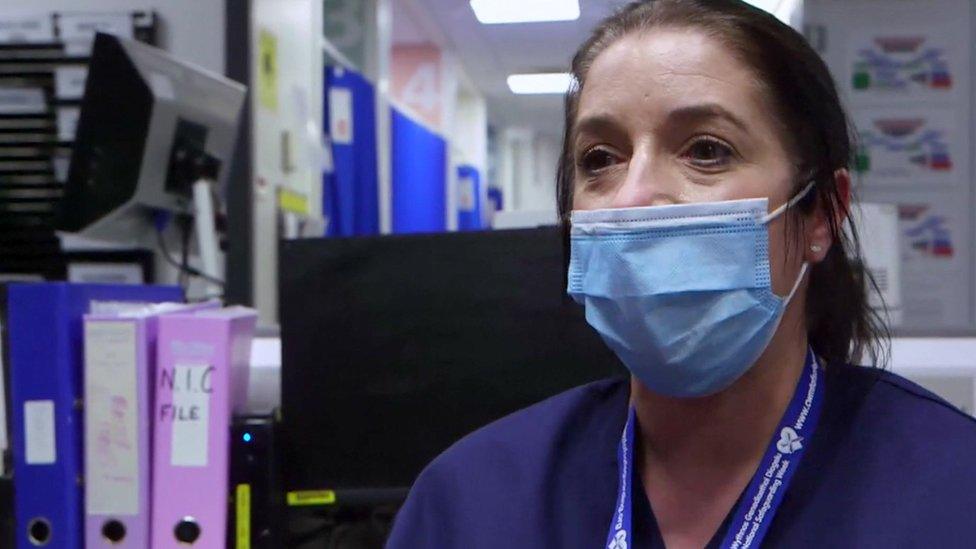
Sarah Fogarasy was the senior nurse on duty as 13 ambulances queued up outside her A&E department
Senior A&E nurse Sarah Fogarasy, who was on shift as the ambulances arrived, said there was no capacity at the unit - a situation that left her wanting "to leave".
"We had to escalate it to our site manager and deputy head of nursing who were liaising with the executive team on call," she said.
"And then it got to 13 patients outside - I had no capacity in this unit, no resuscitation capacity, no capacity to put a patient on CPAP [continuous positive airway pressure] should they require that and no physical areas to put a patient in.
"It was overwhelming."
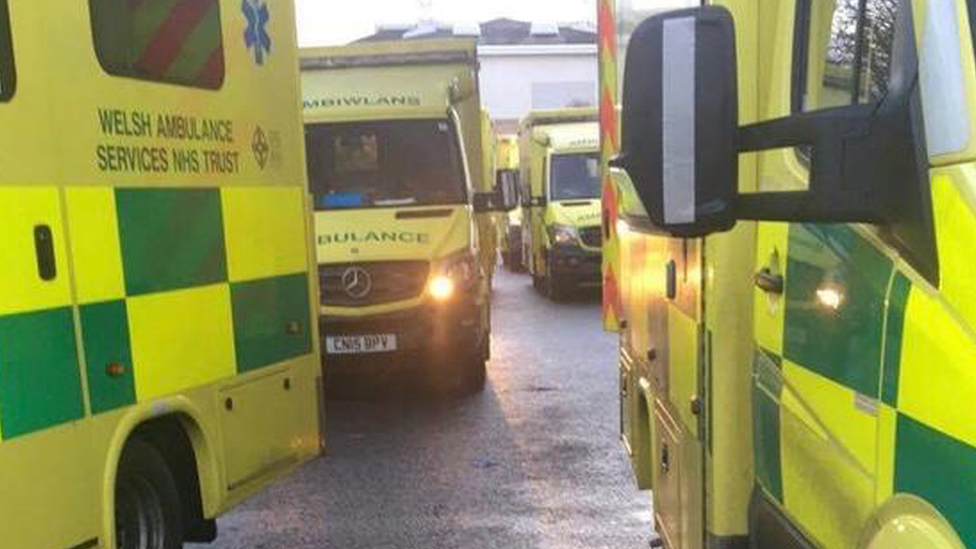
On Saturday, 13 ambulances queued outside the hospital's A&E department
She said she found it hard to keep going.
"This bit makes me quite emotional… for the first time I was sat trying to coordinate this department and I had that overwhelming fear that I just wanted to leave," Ms Fogarasy continued.
"I was just - 'I'm done. I'm done with this'... and it's scary, it fills you full of fear when you have got 13 ambulances outside, queuing around the carpark. Where do you go from that?"
'Sheer determination'
She said it was the team that kept her going: "I started looking around to all the staff working tirelessly and just trying to remember what we're here for and why I became a nurse.
"I know it sounds soppy but it's literally the humanitarian effort that has gone into [fighting] this pandemic that has kept people going.
"It's the sheer determination and guts of the staff working in these times that is so powerful, that keeps the shift going."
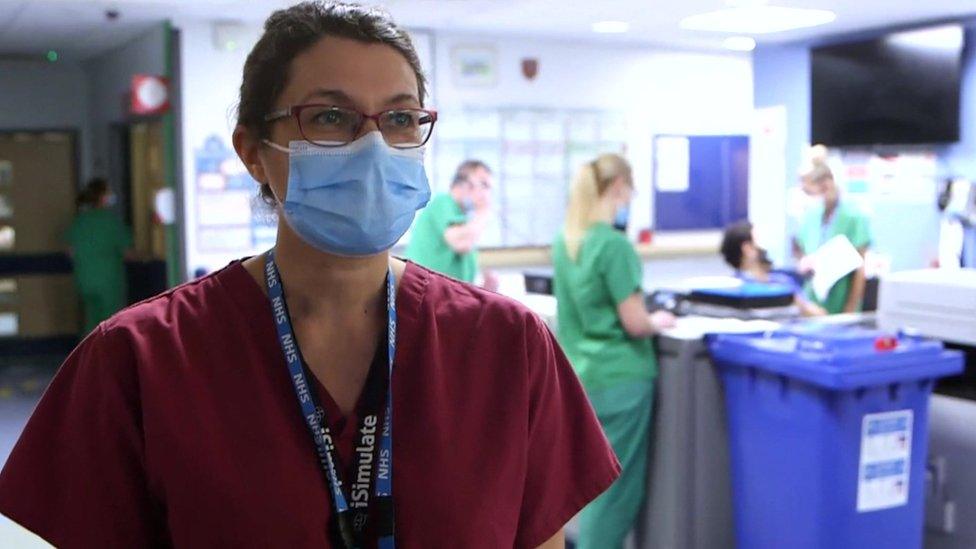
Emergency Medicine Consultant Amanda Farrow said it was a "very emotional time for everyone"
Dr Farrow, emergency medicine consultant, said staffing and bed numbers were of particular concern.
"In the emergency department the challenge we have is with regards to flow, so that is our daily challenge," she explained.
"And we say it's like playing a game of Tetris trying to work out which patient you can put where."
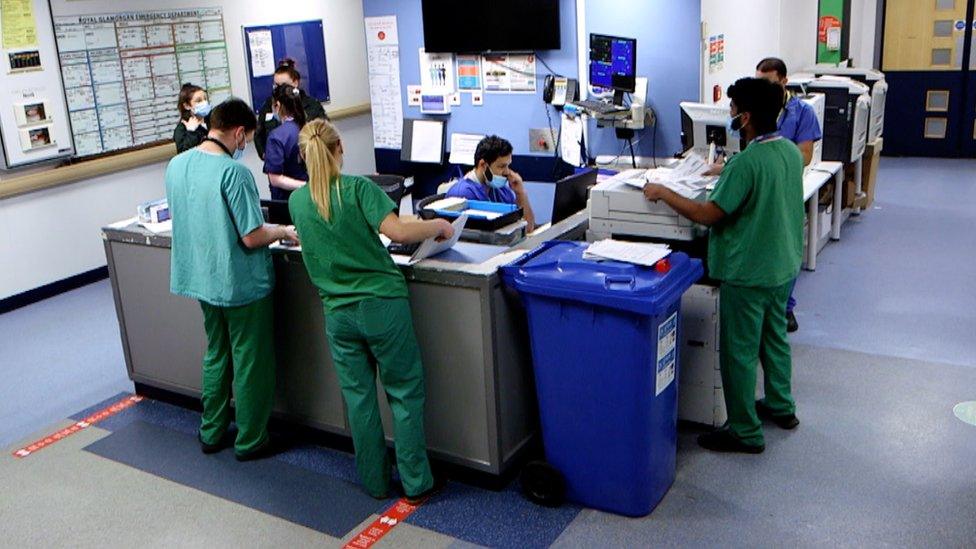
Staff reported feeling overwhelmed as they work through the second Covid wave
She said the second wave of the virus had also seen more staff off sick with Covid and isolating - with some becoming very ill.
"We've had staff in as patients and one of my colleagues - I saw them when they were critically ill and ended up going to intensive care," continued Dr Farrow.
"So it's very emotional time for everyone as well you know, looking after the sick patients and looking after your colleagues.
"There's a level of anxiety still around - will you be the next person to get this disease?"
'More younger Covid patients'
She said although fewer people were attending A&E, they were seeing more people arriving by ambulance and presenting with more complex needs.
"The group of patients we are seeing this time I think is different, we're definitely having more younger people with Covid that are becoming sick, the volume is very high in the community.
"I think people are afraid of come into the hospital as well, so there are still quite a lot of patients who leave it maybe a bit too late before they're seeking hospital attention."
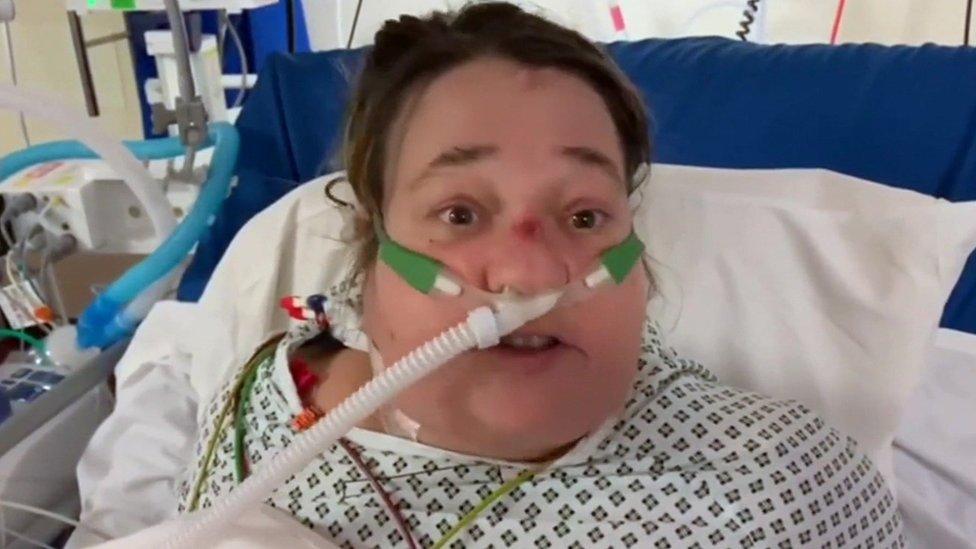
Speaking from her intensive care bed, Helen Whatmore said she was extremely grateful to staff
Helen Whatmore, 45, from Beddau, has been hospital since early December after developing Covid symptoms.
Speaking from her intensive care bed, she said she had been unwell in February so assumed she had already caught the virus.
"I honestly didn't believe it was as bad until I caught [Covid] this time," she said.
"This time it's absolutely knocked the socks off me. It's nearly killed me.
"A friend of mine passed away as I came into hospital and I came down very rapidly with Covid, kidney problems and pneumonia."
She said she was grateful for the care she had received: "The nurses are coming in [working] all shifts, they're fighting for your loved ones, from the time they enter right until the time they leave, then they're changing over and doing the same again.
"People are passing away… how much more have they got to do? We're asking them to protect our children and our families. Why are we not protecting them ourselves? Saving our families and our own children."